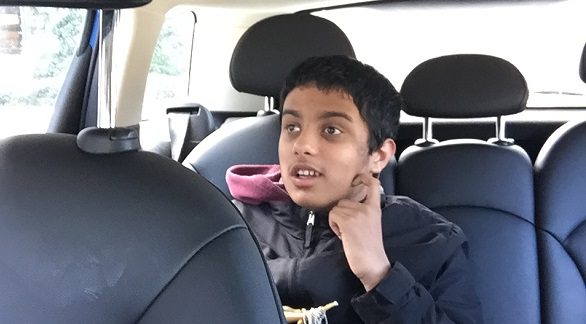 Ali Family Autism Truths #15 – April 15, 2016
Ali Family Autism Truths #15 – April 15, 2016
One of the dangers in chronicling D’s and our family’s autism journey is taking a story that is supposed to be about him and turning it into a story about us. Or me. I know that has happened one too many times over the years. Some of it is inevitable, given that instead of D writing or sharing his stories due to the profoundness of his autism, I’ve taken on that job.
And really, this is the question I’ve been pondering for a long time. Do I have the right to tell his story? Our collective story? Yes. But his? As parents we do a lot of things for our kids, on behalf of our kids and for their own betterment. We make judgment calls all the time. But still …
Not to say I haven’t sought his permission time and time again, and I get a “Ya!” from him, but as well as I know him, I cannot be sure that his “Ya” means, – “Yes, Mamma, you can go ahead and write about that good time, or that hard time and share it with everyone in hopes of affecting some change.”
I think this is a tightrope walked by all bloggers who are writing about a person or a subject that is not their exclusively own story. Autism isn’t my story. It is a huge way. But it isn’t in the most important way.
I’m not the one living it.
Living with him, living with it – yes. Has it shaped our whole family? Indelibly and permanently. Is it our reality, too? Yes.
But not living it.
The mundane, the routine, the ups and downs, the challenges, the epic lows and blissful highs of autism – they are all D’s, and after him they are ours – as his mother, father, sister, brother. As the ones closest to him and intimately supportive of him in every aspect of his day and life, we are part of his autism living, his autistic journey.
But at the end of the day, we are not the ones living it. We will never really know – not until that day comes that he can tell us in some way, or at the end of days when we stand in front of God and bear witness to D’s story in his own words.
So to everyone who responds to these posts or anything snippets I write on D and autism on social media, I want to offer a few gentle but necessary truths or pieces of advice. They come from a place of kindness and concern – that we use the right language, offer the respect and dignity that everyone deserves. That we consider the ones living with autism or any disability first, then the ones supporting them.
Truth Number One: I’m not “dealing” with D. A lot of times I get comments or I see my stories framed as “I don’t know how you deal with …” or “How this mother deals with her autistic son …” I don’t deal with D. I love D. I raise D. I parent D. I do what any other mother does for their child.
Which bring us to Truth Number Two: “You are such an amazing mother!” or “I don’t know if I could raise a special needs child.” Yes you can. You just do it. D was born to me. It’s my privilege to raise him (and A and H) and learn from him. If he had been born to anyone else, I have to believe another parent would simply give their best love and do their best job by him as well.
Truth Number Three: “Praying for you.” Or “Sending you good vibes and praying things get easier for you.” This is a tough one. Yeah, I need prayers and good vibes. Like all the time. We all do. But the thing is – it’s really D. Pray for him. Send him your good vibes. If he continues to find his peace and calm and happiness and make progress on his own terms, then my happiness is made, too. Any parent will understand this – we just want our kids to do well and be happy. That makes all the difference in our lives as well.
Truth Number Four: Talk to D. I guess this is for those of you who meet us in person or socialize with us. Really, this truth is self-directed at our own family. We all need to talk more directly to the one with autism or any disability. Whether or not they reply or answer back – give them the courtesy of talking to them, not about them like they’re not right in front of you, or not over them. Often my own kids will ask me something about D, and I say – he’s right there. Ask him yourself. Most often D won’t answer them in a way they understand, but at least the conversation is being directed directly at him.
At the midpoint of Autism Awareness/Action/Acceptance month, this is what I have to offer: I asked D what makes him feel better. Kau-let (chocolate) is what he had to say.
There you have it, folks. Go eat some chocolate and feel better.











